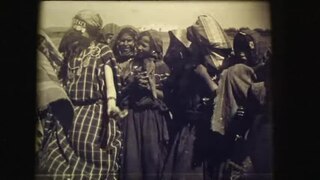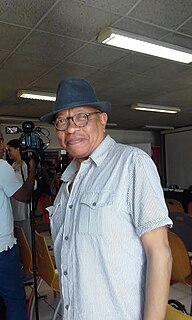Related Research Articles

Cinema of Africa is both the history and present of the making or screening of films on the African continent, and also refers to the persons involved in this form of audiovisual culture. It dates back to the early 20th century, when film reels were the primary cinematic technology in use. During the colonial era, African life was shown only by the work of white, colonial, Western filmmakers, who depicted Africans in a negative fashion, as exotic "others". As there are more than 50 countries with audiovisual traditions, there is no one single 'African cinema'. Both historically and culturally, there are major regional differences between North African and sub-Saharan cinemas, and between the cinemas of different countries.
Mohamed Chouikh is an Algerian film-maker and actor.
Zeka Laplaine, sometimes credited as José Laplaine, is a director and actor from Ilebo in the Democratic Republic of the Congo. The child of a Portuguese father and Congolese mother, he moved to Europe when he was 18. His 1996 short film Le Clandestin was featured at the 2010 Amakula International Film Festival in Uganda. He portrayed a cowboy alongside Danny Glover in Death in Timbuktu, a film within a film in the Council of Europe Film Award-winning film, Bamako. Laplaine is a member of France's "Guilde Africaine des Realisateurs et Producteurs".
Souheil Ben-Barka is a Moroccan film director, screenwriter and film producer. He directed seven films between 1974 and 2002. His 1975 film La guerre du pétrole n'aura pas lieu was entered into the 9th Moscow International Film Festival. His 1983 film Amok won the Golden Prize at the 13th Moscow International Film Festival. In 1987 he was a member of the jury at the 15th Moscow International Film Festival.
Cairo Higher Institute of Cinema was founded in 1957 as the first of its kind in the Middle East and Africa, and is affiliated to the ministry of culture. The institute is a member of the International Organisation For Cinema Colleges and Institutes. Over years the institute participated in many international festivals and gained many awards and honour certificates. Beside the bachelor's degree, the institute grants master's and PhD degrees in the art and science of cinema.

Zohra is a 1922 silent 35 mm short film from Tunisia by Albert Samama ('Chikly'). It was the first indigenous North African film production. The movie script was written by Chikly's daughter, Haydée Chikly, who also edited and starred as the key female protagonist in the film.

Raymond Rajaonarivelo is a Malagasy film director.
Lanciné Diabi is an Ivorian filmmaker.
Benoît Ramampy (1947-1996) was a Malagasy film director.
Moussa Kemoko Diakité is a Guinean cinematographer and film director.
Pierre-Marie Dong (1945-2006) was a Gabonese film director, who was also Minister of Culture in Gabon at the end of his life. Along with Charles Mensah and Simon Augé, Dong "is considered the pioneer of Gabonese film".
Jean-Michel Tchissoukou (1942-1997) was a Congolese filmmaker.
Abdellah Rezzoug or Abdella Zarok was a Libyan filmmaker. In the early 1970s he made the first Libyan feature film, When Fate Hardens.
Bassek Ba Kobhio is a Cameroonian filmmaker and writer.
Nadia Salem is an Egyptian filmmaker.
Pauline Mvele is an actress, director and screenwriter from Burkina Faso. Mvele is known for producing documentaries, and currently lives in Gabon. Her documentaries focus on issues such as HIV/AIDS in Africa, and the mistreatment of widows and prisoners in Gabon. In 2014 her film won best film at the Burundi Film Festival.
Charles Mensah was a Gabonese filmmaker, screenwriter and production manager. Popularly known as the "The Gentleman of African Cinemas", Mensah contributed in several critically acclaimed documentaries including Équateur, Les Couilles de l'éléphant and Lybek, the crunch of the alive. He worked as an activist for the development of independent southern cinema for a career spanned more than three decades.
Tom Ribeiro is a Ghanaian writer and director. He wrote and directed several Ghanaian movies made in the post-colonial era, mainly under the production rights of the Ghana Film Industry Corporation (GFIC), which was set up by Osagyefo Dr Kwame Nkrumah. These movies included Genesis Chapter X (1977), Dede (1992), Set on Edge (1999) The Visitor (1983), Out of Sight, Out of Love (1983), Rituals of Fire and The Village Court.

The Killers is a 1971 Egyptian crime thriller directed by Ashraf Fahmy. The film stars Salah Zulfikar and Nahed Sherif.
Abdelkrim Mohamed Derkaoui is a Moroccan director and producer.
References
- 1 2 3 Douglas A. Yates (28 December 2017). "Cinema". Historical Dictionary of Gabon. Rowman & Littlefield Publishers. pp. 119–. ISBN 978-1-5381-1012-6.
- ↑ Diawara, Manthia (1992). African Cinema: Politics & Culture . Indiana University Press. pp. 62–63. ISBN 0-253-20707-X.
- 1 2 Roy Armes (2006). African Filmmaking: North and South of the Sahara . Indiana University Press. p. 46. ISBN 0-253-21898-5.
- ↑ David E. Gardinier (2012). "Dabany, Patience". In Emmanuel Kwaku Akyeampong; Henry Louis Gates Jr (eds.). Dictionary of African Biography. OUP USA. pp. 147–48. ISBN 978-0-19-538207-5.
- ↑ Roy Armes (2008). "Dong, Pierre-Marie". Dictionary of African Filmmakers. Indiana University Press. p. 94. ISBN 0-253-35116-2.
- ↑ Imunga Ivanga, The revival of Gabonese cinema, Revue Africultures, Vol. 36, 2001.
- ↑ Roy Armes (2008). "Ivanga, Imunga". Dictionary of African Filmmakers. Indiana University Press. pp. 78–79. ISBN 0-253-35116-2.
- ↑ Annelies Hickendorff (2014). Gabon. Bradt Travel Guides. p. 21. ISBN 978-1-84162-554-6.
- ↑ Roy Armes (2008). "Koumba-Bibidi, Henri-Joseph". Dictionary of African Filmmakers. Indiana University Press. p. 85. ISBN 0-253-35116-2.
- ↑ Douglas A. Yates (28 December 2017). "Ivanga, Imunga (1967-)". Historical Dictionary of Gabon. Rowman & Littlefield Publishers. p. 254. ISBN 978-1-5381-1012-6.
- ↑ African cinema makes a comeback, but Hollywood gets top billing, Arab News, 1 November 2017.